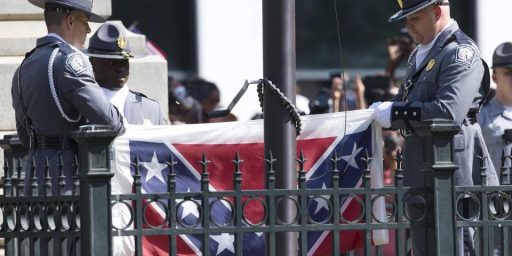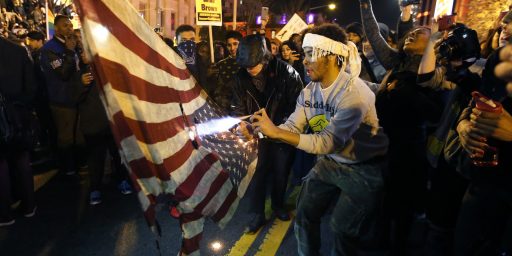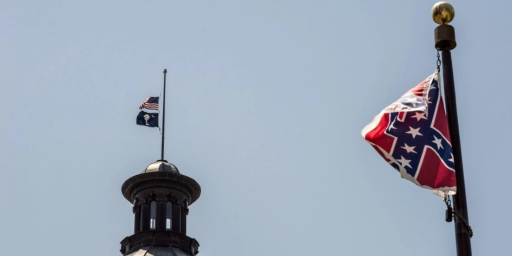REGIME CHANGE: 50 YEARS AND COUNTING
In a continuation of a recent theme of his columns, George Will points out that today is the 50th anniversary of the overthrow of Iranian Premier Mohammed Mossadegh by Shah Mohammed Reza Pahlevi, which was accomplished with more than a little help from the United States.
[P]rincipal U.S. operative … Kermit Roosevelt, Teddy’s grandson] said the coup succeeded because the CIA had accurately concluded that the Iranians, including most of the military, “wanted exactly” the result we were seeking. “If we,” said Roosevelt, referring to the CIA, “are ever going to try something like this again, we must be absolutely sure that [the] people and army want what we want. If not, you had better give the job to the Marines!”
That obviously is the best circumstance, although it would seem one difficult to ascertain in a totalitarian regime. For example, it’s unclear to what extent the Iraqi military was loyal to Saddam. Clearly, the top leaders were, because those whose fealty was doubted even slightly were murdered. Given their enthusiasm to fight in two recent wars with the United States, it would seem that the rank-and-file were far less supportive.
Again, the reason for remembering such U.S. undertakings at this moment is not to reopen arguments about their wisdom but to underscore the point that the United States has been practicing the craft of regime change for a long time. And that such changes inevitably are the beginnings of long and sometimes melancholy entanglements.
We are in the process of acquiring yet another in Liberia. That one arises from historical ties, supplemented by President Bush’s post-9/11 conclusion that “weak states, like Afghanistan, can pose as great a danger to our national interests as strong states.”
The Economist of London, which was founded in 1843, when British imperialism was flourishing, is neither squeamish about the fact of empire nor tainted by anti-Americanism. But as an anxious friend, the Economist notes:
In less than two years the United States has occupied two Muslim countries with a combined population of more than 50 million. Afghanistan “remains a failed or nonexistent state” where “the government’s writ does not extend much beyond Kabul” and “local warlords, deep into the heroin trade, wield the real power.” In Iraq, where a U.S. general says the current condition is “war, however you describe it,” there are 161,000 occupying troops, of which 148,000 are American. The largest contingent of the other 13,000 are British and the other 18 participating nations have sent on average a few hundred.
It might be time to pause in pushing the American project that was implicit in Woodrow Wilson’s assertion that America’s flag is “the flag not only of America but of humanity.” Wilson was echoing Lincoln’s belief that our nation is “dedicated to a proposition” that is “an abstract truth, applicable to all men and all times.” But the belief that the American model of civic life could be a blessing to everyone is as old as Benjamin Franklin’s proclamation that America’s “cause is esteemed the cause of all mankind.”
Franklin did not say, but probably was wise enough to think: “Eventually. Maybe.”
I agree with Will that we should be careful of biting off more than we can chew in these nation building quests, for a whole variety of reasons I won’t rehash here. I disagree, however, with the idea that people outside the West don’t desire freedom.
Now, obviously, Maslow’s hierarcy is in play. In societies where simply feeding one’s family is at issue or even minimal standards of civil order are lacking, people will gladly endure the most authoritarian regimes if they can provide these basic necessities. In the case of Iraq, for example, until we can get the lights to stay on and get people back to work, the fact that we’re planning to turn civil authority over to semi-elected Iraqi officials is not going to spark much enthusiasm for the American presence.
Donald Rumsfeld was interviewed on NPR this morning (or, at least, the interview was aired this morning) and said that, despite popular belief, there were months of planning that went into the rebuilding phase of the operation. He explains that much time was spent planning for worst-case contingencies that never materialized and that many of the comparatively minor crises that did creep up were unexpected. And he notes we had no clue about just how obsolescent their power grid was. Such wrenches in the plans are not unexpected–call it the fog of peace, if you will–but the fact that Murphy’s Law will kick in has to be considered before undertaking these operations.






Will, as usual, provides interesting perspective. I don’t think that his piece was as cautionary as you read it, and I don’t think he believes that people in other countries don’t deserve democracy.
I think he was merely emphasizing how fluid everything is…
John,
I generally agree with Will’s take on things and only differ with him in degree rather than kind here.
He’s certainly correct on the fluidity point.
I don’t take him to be sayng they don’t deserve freedom. In conjunction with his NY Post piece over the weekend, I get Will to be saying that people in the 3rd World aren’t yearning to be free nearly as much as we think they are.
—